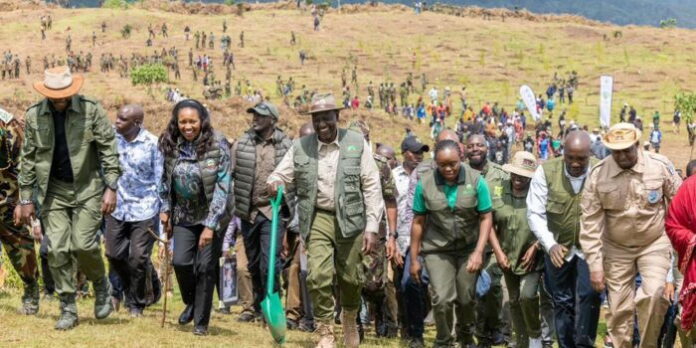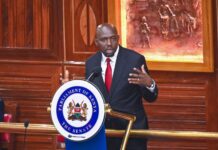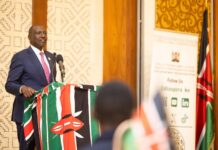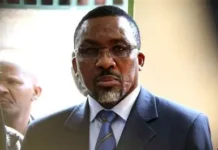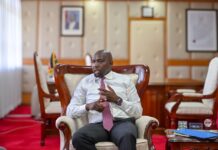President William Ruto is facing criticism from the opposition following his decision to lift the logging ban.
In a statement on Tuesday, November 4, People’s Liberation Party (PLP) leader Martha Karua accused Ruto of undermining Kenya’s environmental commitments and betraying public trust.
“The decision by William Ruto and his Kenya Kwanza administration to lift the logging ban on Kenya’s forests is a betrayal of logic, science, and the nation’s own environmental commitments.
“For a country that has pledged to plant 15 billion trees by 2032 and poured billions of shillings into that ambition, allowing loggers back into our forests reeks of recklessness, short-sightedness and a scheme to hoodwink Kenyans,” she said.
Karua dismissed the government’s justification that the country’s forests contain overstocked mature trees, arguing that such reasoning has historically opened the door to abuse, illegal loggers, and corruption.
“Mr Ruto’s argument for lifting the ban rests on the claim that forests are overstocked with ‘mature trees’ that need to be harvested to create space for regeneration.
“That sounds neat on paper, but in practice it is messy and untidy, because once the floodgates open, illegal loggers, corrupt officers, and politically connected cartels will exploit the chaos. We have seen this movie before, and it never ends well,” she stated.
Karua said the government’s decision contradicts its own flagship environmental projects, particularly the ongoing national tree-planting campaign.
“Kenya’s tree-planting drive has been one of the most inspiring national efforts in recent memory. Families, communities, corporates, and county governments have mobilised to restore degraded land and increase forest cover. The programme has been touted as a cornerstone of our climate strategy; a pathway to carbon neutrality, better rainfall patterns, and improved livelihoods.
“By lifting the logging ban, Ruto has undercut the very foundation of that vision, and we must remind him that he cannot plant seedlings with one hand and wield an axe with the other,” she remarked.
In her statement, Karua also invoked the legacy of the late former Prime Minister Raila Odinga, who championed environmental conservation and led efforts to restore the Mau Forest during his time in government.
“As the country is still mourning the loss of Rt. Hon. Raila Odinga, we remind Ruto that Raila fiercely advocated for the preservation of the Mau Forest Complex.
“As Prime Minister, he took the politically costly but principled stand to stop illegal logging, restore the Mau, and secure community land titles. Barely a month after his passing, he is dismantling the very environmental protections he fought for. This is a betrayal to his legacy,” she said.
Karua further criticized the manner in which the logging ban was lifted, accusing Ruto of disregarding public participation requirements.
“Kenya is a constitutional republic that demands public participation and transparency in all matters of public policy. Yet once again, Ruto has chosen roadside declarations over due process. In 2023, his earlier attempt to lift the logging ban was declared unconstitutional by the Environment and Land Court, which ruled that such a decision cannot stand without adequate public participation. Articles 35 and 69 of the Constitution enshrine the people’s right to access information and to participate in decisions affecting the environment. By ignoring these safeguards, Mr. Ruto not only violates the Constitution, he undermines the very foundation of governance,” she asserted.
Karua warned that while a few sawmills might benefit in the short term, ordinary Kenyans would ultimately bear the brunt of the environmental degradation and climate instability that would follow.
“A few sawmills may run again, but the cost will be paid by farmers grappling with unpredictable rains, pastoralists watching their grazing lands dry up, and urban residents enduring water rationing. Economic growth built on environmental ruin is a hollow victory,” she said.
Karua called on Kenyans to defend the country’s natural heritage and reject what she termed a dangerous reversal of hard-won environmental gains.
“Kenyans have worked too hard to reclaim their forests, and for someone to throw that progress away for short-term political or economic convenience is unacceptable, illogical and immoral. Our forests are not idle assets, but living infrastructure that is vital to our survival, our economy, and our climate resilience,” she declared.
Speaking during a visit to Elburgon in Nakuru County, Ruto lifted Kenya’s logging ban, saying the decision is meant to revive the timber and furniture industries, create jobs, and make use of trees that have matured and are rotting in forests.
He explained that the directive only permits the harvesting of mature trees and should not be mistaken for a licence to destroy forests.
“The lifting of the logging ban does not mean that we destroy our forests. It means we will harvest trees responsibly, replant them, and ensure our forests remain sustainable,” he said.
Ruto added that sawmillers will be allowed to obtain timber from government forests under strict supervision to guarantee responsible use of forest resources.
He also directed that Kenya stop importing furniture, particularly from China, urging local industries to use Kenyan timber instead.
“We shall reopen the timber factories here in Elburgon. I have told my Minister of Trade, Mr Lee Kinyanjui, that importing furniture from China must end. We will use our wood to make furniture,” he stated.
Ruto further said that anyone given a licence to cut down trees will be required to plant new ones to ensure sustainability.
“Anyone who is given a licence to cut down trees will also plant where they cut down those trees so that we have trees to cut down in the future,” he said.
The original logging ban was introduced in 2018 to curb deforestation and protect Kenya’s water catchment areas.
In 2023, a court ruled that an earlier government attempt to lift the ban was unconstitutional due to a lack of public participation and transparency.









